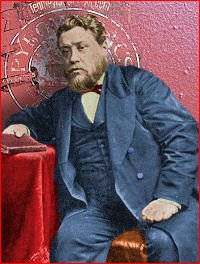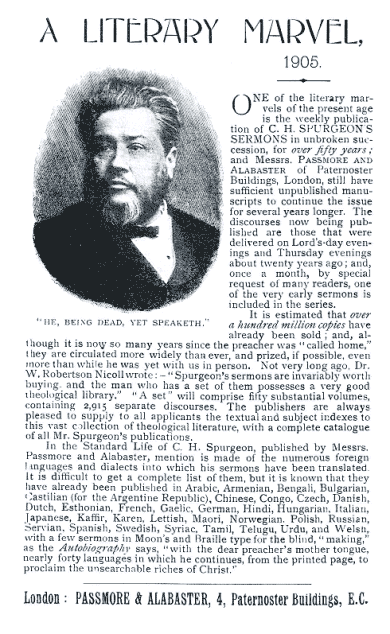"Hermeneutics" (plural in form, but used with both singular and plural verbs) is the art and science of Biblical interpretation. It's the set of rules, held consciously or not, that govern the way you read the Bible. You have a hermeneutical construct, I have a hermeneutical construct. It may be pretty darned good, it may be smelly-awful wretched, but you and I have one.
 How one arrives at his hermeneutical position may very well be a chicken/egg conundrum. Does [your-favorite-reprobate's-name-here] read his Bible the way he does because of his appalling lifestyle? Or does he have an appalling lifestyle because of the way he reads his Bible? Or is the relationship symbiotic, co-dependent?
How one arrives at his hermeneutical position may very well be a chicken/egg conundrum. Does [your-favorite-reprobate's-name-here] read his Bible the way he does because of his appalling lifestyle? Or does he have an appalling lifestyle because of the way he reads his Bible? Or is the relationship symbiotic, co-dependent?In my case, doubtless there was symbiosis, but mostly it was the former. I was in a cult called Religious Science, or the Science of Mind. I won't honor it with a link. I was New Age before New Age was cool. Back then we called it "New Thought," though it was barely either. (If you've ever sung "Let There Be Peace On Earth," you've sung a song cherished by that cult.)
It was your standard panentheistic Christian heresy, very like Christian Science except we weren't so negative on seeing doctors. Fundamentally, Religious Science taught that God is in all things, and expresses Itself as and through all things. Therefore, we are all expressions of God, and all have within ourselves the Christ-consciousness. "Christ" is the principle of god-consciousness, the I AM, within everyone. Our goal in life was to harmonize our minds with God, and thus to manifest truth, love, joy, stuff.
Dizzy yet?
Now, like most American cults, Religious Science wants to get on the Jesus-bandwagon by mouthing great platitudes about Jesus, how He was a great prophet, a great teacher, a great mystic, the most perfect manifestation of God-consciousness to date. But Jesus was no different than we, and we can all live the same life.
Stay with me, I am going somewhere with this.
The Religious Scientist runs into the problem that Jesus did not say much that sounded like any of that.
And that's where hermeneutics comes in. See, the problem is that Christians have misunderstood and misrepresented Jesus all this time. They took His words too literally and shallowly, when really they had a deeper, spiritual meaning. When He said to pray, "Our Father," He was saying that all without distinction are God's children.
So what about Hell, sin, salvation? No problem; Hell is just the experience of being at seeming disharmony with the One Mind; sin are thoughts out of harmony with the One Mind; salvation is just reaffirming and manifesting your union with the Godhead. See?
Now, the tale of my conversion, and of why I am still a Christian, is a much longer yarn than I will untangle here, except to focus on one aspect: how the Holy Spirit used hermeneutics to convert and save me.
I learned to read the Bible the Religious Science way from my pre-teen years. I looked for (and found) the "deeper meaning" that those idiot Christians and Jesus-Freaks kept stubbornly missing. It was a mindset, on the level of the reflexive.
But I did keep running into things that He said that jarred even my firm grid. It created a slowly growing tension: on the one hand, we thought Jesus was the greatest Teacher and Prophet and Mystic who ever lived; on the other, He sure expressed Himself poorly sometimes! But never mind; we were always there to "help" Him.
The single greatest snag was John 14:6 -- "Jesus said to him, 'I am the way, and the truth, and the life. No one comes to the Father except through me.'"
Sure sounds as if Jesus was saying what we Religious Scientists all denied: that no relationship with God is possible without a personal relationship with the person, the man, God incarnate, Jesus Christ.
But that isn't what we thought he meant. It couldn't be. It would destroy the whole foundation and superstructure. Here is how Ernest Holmes, founder of that cult, explains Jesus' words: "We cannot come unto the Father Which art in Heaven except through our own nature." So, what Jesus really meant was the precise opposite of what He seemed to be saying.
That worked fine for me, for awhile.
But over the period of many months, the Spirit of God did a work on me, convicting me of sin, exposing to me my actual distance from actual God, my God-un-likeness, the multilevel trainwreck that was me.
When I combined the realizations that I basically had found a religion that told me what I wanted to hear, and that I myself wasn't much better than a drooling idiot in the ways that mattered, it shook me to my foundations -- and I started looking at Jesus anew. And I prayed, that God would show me the way to Himself, even if it meant that I had to become a Jesus Freak. (That was the worst thing I could think of at the time.) What did I have to do?
And again loomed John 14:6, giving me Jesus' answer to my question.
This was the great Teacher, the great manifestation of God, Jesus, clearly laying out the only way I could come to God. But what did He mean? Did He mean that I was my own way to God (with Religious Science)? Or did He mean that I needed to believe in and know Him, Jesus, personally (with the Jesus Freaks)?
I had no idea, but at that point my very life was hinging on a hermeneutical question.

Here's the line of thinking that the Spirit of God used to deliver me from the deceptive maze of mystical subjectivism.
I took the premise that Jesus was the greatest Teacher, and assumed that a good teacher is a good communicator. He says what he means; his words convey his meaning. He speaks to be understood by his audience.
So then I simply posed this question question to myself: "If Jesus had meant to say that each of us is, within himself, his own way to God, could He have said it more clearly?" To put it differently, do these words best express that thought? The candid, inescapable answer was an immediate No. In fact, if that had been what Jesus had meant to say, He could hardly have phrased it more poorly... in which case He wasn't much of a teacher at all, let alone the greatest ever.
Then I asked myself this: "If Jesus had meant to say that He Himself personally is the way, the truth, and the life, and that no one can have a relationship with God apart from relating to Jesus Himself, could He have said that more clearly?" I was forced to admit that, in fact, that thought is exactly what these words most naturally express. (Later I was to learn that the Greek original underscores this very point all the more emphatically.)
That was a turning-point. I had to face the fact that Jesus did not believe what I believe. Jesus did not think God could be known as I thought He could be known.
And that, in turn, threw the question to the decisive fork in the road: who is more credible? Jesus, or me?
Had you said "Hermeneutics" to me at the time, I might have responded, "Herma-who?" Had you further said "Grammatico-historical exegesis," I couldn't even have managed that much. But that is precisely what was going on.
Now it's well over thirty years later, I've taken classes in Hermeneutics on the master's and doctoral level, read books and articles, written on the subject, fleshed out and used an array of principles of interpretation. But still that single method, that simple question (along with its implications), has resolved more knotty issues for me than any other. It's why I'm an inerrantist. It's why I'm a Calvinist. It is at the root of my core convictions. In fact, at bottom, in the hand of God it is why I am a Christian.
As I've fleshed it out, it is simply a formulation of Hebrews 1:1-2a. The Bible is God's unfolding Word, and it is God's Word to us. He speaks to be heard, and understood. Hence its meaning is not a matter for secret-club decoder-rings, arcane rituals, and secret councils composed of a different class. It is to be understood according to the normal canons of language.
Does that matter? It sure matters to me.
It's what the Lord used to save me.


 One great evil of the times is the insatiable craving for amusements. That men should have rest from labour, and that they should enjoy such amusements as refresh both body and mind, nobody wishes to deny. Within suitable bounds, recreation is necessary and profitable; but it never was the business of the Christian Church to supply the world with amusements.
One great evil of the times is the insatiable craving for amusements. That men should have rest from labour, and that they should enjoy such amusements as refresh both body and mind, nobody wishes to deny. Within suitable bounds, recreation is necessary and profitable; but it never was the business of the Christian Church to supply the world with amusements.
 What we do best here at TeamPyro is
What we do best here at TeamPyro is 

 Billy Morrison spoke in our church in Aberystwyth on June 20th. I had not seen him for six or seven years when I visited the prison in Northern Ireland where he was serving twelve years for terrorist offences. His father had been a member of the loyalist para-militaries and so he was raised to consider fighting republicans as a justifiable action—'defending our patch.' While Billy was in prison a man called Walter gave him a book of Spurgeon's sermons to read. That morning he had no interest in God at all, and no desire to become a Christian. That afternoon he read that sermon, and that evening he was on his knees before God asking God to be merciful to him. The next day he met his gang of friends and told them that he had become a Christian. Not only did that terminate most of his friendships but immediately he forfeited all the protection that membership of the para-military groups provide in that confined life behind bars. The sermon of Spurgeon's which he read was on Luke 7:42, "And when they had nothing to pay, he frankly forgave them both."
Billy Morrison spoke in our church in Aberystwyth on June 20th. I had not seen him for six or seven years when I visited the prison in Northern Ireland where he was serving twelve years for terrorist offences. His father had been a member of the loyalist para-militaries and so he was raised to consider fighting republicans as a justifiable action—'defending our patch.' While Billy was in prison a man called Walter gave him a book of Spurgeon's sermons to read. That morning he had no interest in God at all, and no desire to become a Christian. That afternoon he read that sermon, and that evening he was on his knees before God asking God to be merciful to him. The next day he met his gang of friends and told them that he had become a Christian. Not only did that terminate most of his friendships but immediately he forfeited all the protection that membership of the para-military groups provide in that confined life behind bars. The sermon of Spurgeon's which he read was on Luke 7:42, "And when they had nothing to pay, he frankly forgave them both."


 There. I changed shirts. That's much better.
There. I changed shirts. That's much better.


 I just wanted to say that since Phil is busy this week, it might serve him well for all of us to take five minutes (or an hour -- don't be stingy) and pray for him as he prepares for the Shepherd's conference. He's carrying a pretty big share of the work himself this year, and wouldn't it be great if God was in it?
I just wanted to say that since Phil is busy this week, it might serve him well for all of us to take five minutes (or an hour -- don't be stingy) and pray for him as he prepares for the Shepherd's conference. He's carrying a pretty big share of the work himself this year, and wouldn't it be great if God was in it? :
: Next week is the Shepherds' Conference at Grace Church. Between now and then, I need to finish my preparation for five seminars, so don't look for me to be blogging much until after the conference is over. The other Pyros will have to carry the load. If you're coming to the conference, look me up and ask for a free copy of one of the original
Next week is the Shepherds' Conference at Grace Church. Between now and then, I need to finish my preparation for five seminars, so don't look for me to be blogging much until after the conference is over. The other Pyros will have to carry the load. If you're coming to the conference, look me up and ask for a free copy of one of the original 




 Now, the right reason to complain about this list and all the books under this list is that there should be no REDS at all on this list. If you ask me – and you didn't, so forgive my audacity – the ECPA/CBA supply chain is wickedly shamed by the fact that there is even one "no-go" author or book on its list of top sellers. Seven is a complete travesty. And to take that premise one step further, the fact that any of these yellows are there when they could have been fixed in order to avoid being yellow is also a terrible shame.
Now, the right reason to complain about this list and all the books under this list is that there should be no REDS at all on this list. If you ask me – and you didn't, so forgive my audacity – the ECPA/CBA supply chain is wickedly shamed by the fact that there is even one "no-go" author or book on its list of top sellers. Seven is a complete travesty. And to take that premise one step further, the fact that any of these yellows are there when they could have been fixed in order to avoid being yellow is also a terrible shame. So when we come out and bash CBA, let's first keep in mind that someplace between 60% and 70% of its "stuff" is pretty much non-offensive. I will be the first one to stand in line to say, "it should all be inoffensive," but to whom? For example, I would say that there should be no Roman Catholic books in a Christian bookstore (sorry, Phil: that one's gonna hurt I am sure), but I am certain that many people – like Catholics, for example – would strenuously disagree with me. James Dobson and Chuck Colson would disagree with me. But then what do you do with C.S. Lewis who studiously avoided that topic, or someone like Chesterton?
So when we come out and bash CBA, let's first keep in mind that someplace between 60% and 70% of its "stuff" is pretty much non-offensive. I will be the first one to stand in line to say, "it should all be inoffensive," but to whom? For example, I would say that there should be no Roman Catholic books in a Christian bookstore (sorry, Phil: that one's gonna hurt I am sure), but I am certain that many people – like Catholics, for example – would strenuously disagree with me. James Dobson and Chuck Colson would disagree with me. But then what do you do with C.S. Lewis who studiously avoided that topic, or someone like Chesterton?

 But by affirming Solomonic authorship, we have an objective fix on him and his place in the flow of redemptive history. So, do Solomon's writings give any clue to the understanding of Proverbs 16:7? Does he think that godly, wise folks will always be popular folks -- and vice-versa?
But by affirming Solomonic authorship, we have an objective fix on him and his place in the flow of redemptive history. So, do Solomon's writings give any clue to the understanding of Proverbs 16:7? Does he think that godly, wise folks will always be popular folks -- and vice-versa? So when we apply this to Proverbs 16:7, we gain further wisdom. When we affirm that Solomon wrote this proverb, we have a date and an idea of the thought-world from which this insight sprang. In all likelihood, Solomon would have known of the book of Job, for instance. If any book shatters the notion that good behavior always results in a happy life, or that misfortunes are always divine punishments for sin, it would be Job.
So when we apply this to Proverbs 16:7, we gain further wisdom. When we affirm that Solomon wrote this proverb, we have a date and an idea of the thought-world from which this insight sprang. In all likelihood, Solomon would have known of the book of Job, for instance. If any book shatters the notion that good behavior always results in a happy life, or that misfortunes are always divine punishments for sin, it would be Job. Last year I taught on the Bible -- where it came from, how we receive it, can we trust it, etc. We started that class as a small group of 4 or 5 and ended with almost 20 kids in the class. This year they let me have all 40 of our Sunday attenders because I'm teaching about the Gospel.
Last year I taught on the Bible -- where it came from, how we receive it, can we trust it, etc. We started that class as a small group of 4 or 5 and ended with almost 20 kids in the class. This year they let me have all 40 of our Sunday attenders because I'm teaching about the Gospel. It's because we are intransigent baptists, really: we are afraid of saying something that superficially sounds like Roman Catholicism (or worse: Presbyterianism -- SHEESH!) and we are afraid that we might accidentally say something that means we ought to gather together in a more substantial way than just for a nice bit of worship (3-4 hymns) and a rousing 25-minute batch of Calvinistic pep talk from the preacher.
It's because we are intransigent baptists, really: we are afraid of saying something that superficially sounds like Roman Catholicism (or worse: Presbyterianism -- SHEESH!) and we are afraid that we might accidentally say something that means we ought to gather together in a more substantial way than just for a nice bit of worship (3-4 hymns) and a rousing 25-minute batch of Calvinistic pep talk from the preacher. The following is excerpted from a sermon titled "The Lord's Own View of His Church and People," preached at the Metropolitan Tabernacle, London, and first published in 1887.
The following is excerpted from a sermon titled "The Lord's Own View of His Church and People," preached at the Metropolitan Tabernacle, London, and first published in 1887. The church is a separate and distinct thing from the world. I suppose there is such a thing as "the Christian world"; but I do not know what it is, or where it can be found. It must be a singular mixture. I know what is meant by a worldly Christian; and I suppose the Christian world must be an aggregate of worldly Christians. But the church of Christ is not of the world. "Ye are not of the world," says Christ, "even as I am not of the world."
The church is a separate and distinct thing from the world. I suppose there is such a thing as "the Christian world"; but I do not know what it is, or where it can be found. It must be a singular mixture. I know what is meant by a worldly Christian; and I suppose the Christian world must be an aggregate of worldly Christians. But the church of Christ is not of the world. "Ye are not of the world," says Christ, "even as I am not of the world."












